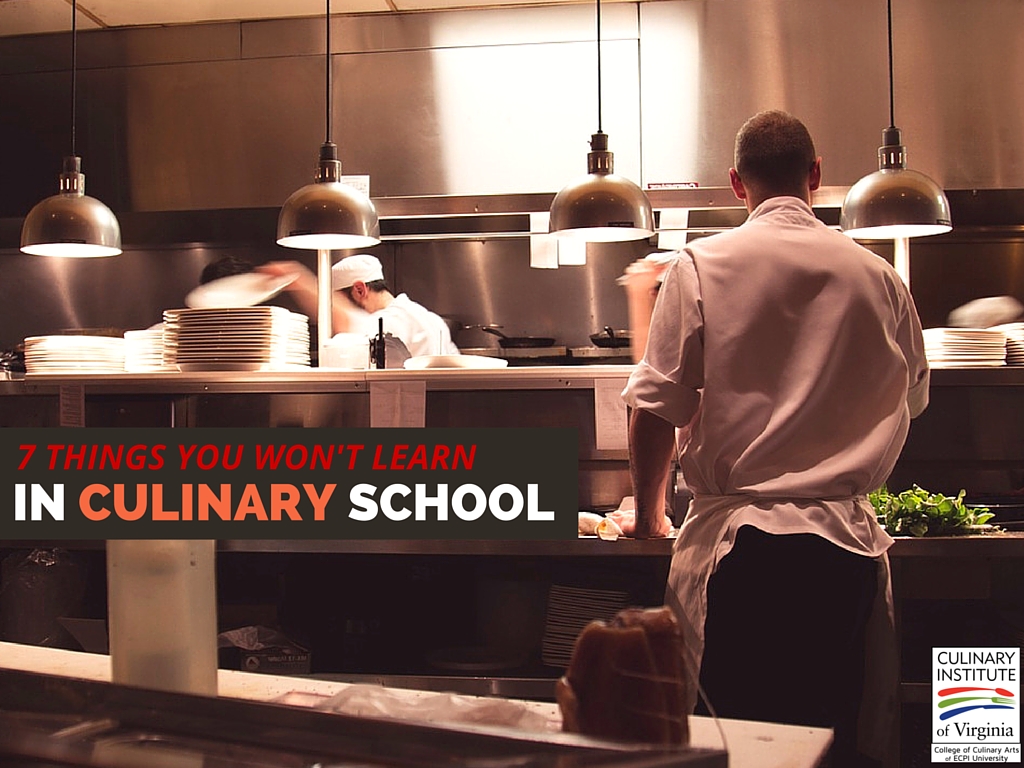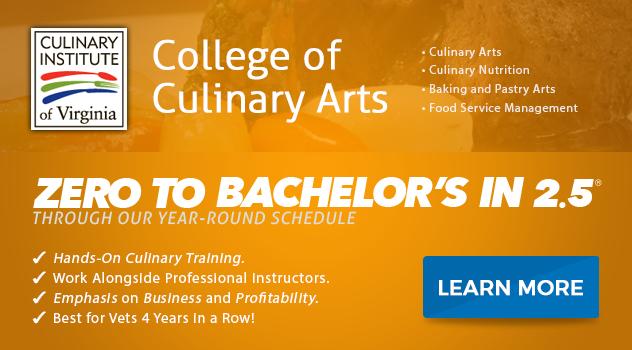 Culinary school can teach you a lot. It can teach you how to handle basic ingredients, simple food preparations, proper storage techniques and a host of other essential kitchen skills. It can also help prepare you for a career outside the kitchen in corresponding fields. You might want to write about food, go into catering or just become a better cook. Whatever your reason for going, keep in mind that culinary school can't teach you everything. Here are a few things you won't learn in any classroom.
Culinary school can teach you a lot. It can teach you how to handle basic ingredients, simple food preparations, proper storage techniques and a host of other essential kitchen skills. It can also help prepare you for a career outside the kitchen in corresponding fields. You might want to write about food, go into catering or just become a better cook. Whatever your reason for going, keep in mind that culinary school can't teach you everything. Here are a few things you won't learn in any classroom.
1. Clean Like a Boss
No matter how well you think you clean or how much cleaning happens in culinary school, you won't understand clean until you are in the kitchen every day. At school, every class cleans up at the end of the session. Contracted cleaners come in regularly to handle deep cleaning. No matter how often you wipe down the counters, it doesn't compare to the requirements in a continuously used commercial kitchen.
2. Abandon Politically Correct Language
Kitchens are often filled with strong language and high volume. Commercial kitchens are high stress, and the way people act in the kitchen reflects that. Cursing, insults, and aggressive behavior are the norm, so leave your sensitivity at the door.
3. Forget About Personal Space
You might have a dedicated station at culinary school, but in a commercial kitchen, you share everything. Every square foot of space is accounted for to give maximum productivity. You will trip over co-workers and fight for every inch of counter space. Even with the optimal kitchen layout, there is never enough room for everyone working on the line. In a working kitchen, you learn to keep your elbows tucked in and work even more efficiently.
4. Prioritize Mise en Place
You'll get an overview of mise en place in school. You might label some of your prep and have it ready for the next day's project. In a commercial kitchen, you'll date everything. Everything you cut and everything you prep will come with a use by date you add to the product. Every dime of product you throw out comes at a cost, and your employer will be counting those pennies. Mise en place helps you maximize the value of foodstuffs. When you have something that is going off, you cook it that day to extend its life. Then you announce a sale on the item. Comprehensive labeling becomes part of your everyday life.
5. Quick Prep Saves Time
In school, you might learn to whisk egg whites by hand or emulsify a sauce. Once you start working in a kitchen, you learn that a blender is your best friend. It turns a 10-minute prep time into seconds, helping you get plates out faster. Even small delays cost in table turnover at restaurants. Slower turnover means less profit. You'll learn a lot about shortcuts once you get to work.
6. Concise Communication
In the classroom, questions are encouraged. In the kitchen, they are not. If you can't communicate what you need in three words or less, you are slowing down the line. When you need the sous chef in front of the oven to step to the side, you say "oven." When you need four minutes on an order for table 25, you say "four minutes." Everyone in the room is working on the same things, so they understand the verbal shorthand. Learn to communicate quickly and clearly.
7. Recipes
You go to culinary school to learn to cook, so you have to learn recipes, right? Not really. At culinary school, you learn foundational skills, not full recipes. That means you might learn all the basic sauce recipes, but not all of their applications. You'll learn how to cook different ingredients without learning how to put those ingredients together to make good food. You'll need to find and develop recipes elsewhere.
Why Go to Culinary School?
While there is a lot you can only learn on the job, culinary school offers significant benefits. Even those who already have careers in food service can find value in a culinary arts degree. There is a lot on the curriculum of a degree program that may not be covered in direct experience. You might learn how to plate according to instructions, but in school, you can learn about plating design for building your dishes. You'll go into costing and menu planning before you have to plan one for work. Many schools also offer externships that put you into a real, working commercial kitchen, so you can get experience for your resume before you start job hunting.
Great program, I've learned a lot about becoming a Chef. Now that I'm in my last term I realize how much I've learned....
Posted by Jamar Bailey on Thursday, September 17, 2015
Culinary School Awaits!
If food is what you love, and you want a career in cooking, contact ECPI University today. You could earn your Associate of Applied Science of Culinary Arts in as little 15 months. It could be the Best Decision You Ever Make!
DISCLAIMER – ECPI University makes no claim, warranty or guarantee as to actual employability or earning potential to current, past or future students or graduates of any educational program we offer. The ECPI University website is published for informational purposes only. Every effort is made to ensure the accuracy of information contained on the ECPI.edu domain; however, no warranty of accuracy is made. No contractual rights, either expressed or implied, are created by its content.
For more information about ECPI University or any of our programs click here: http://www.ecpi.edu/ or http://ow.ly/Ca1ya.


